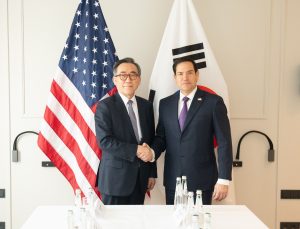South Korean Foreign Minister Cho Tae-yul held a meeting with U.S. Secretary of State Marco Rubio on February 15 in Munich, Germany on the sidelines of the Munich Security Conference. The Cho-Rubio bilateral meeting is the first meeting between the top diplomats of South Korea and the United States since Donald Trump reassumed the presidency in January.
During the meeting, which lasted about 40 minutes, Rubio offered assurances over the U.S. defense commitment to South Korea while reiterating Washington’s conventional policy toward North Korea – which is seeking the complete denuclearization of North Korea. Trump has earlier made reference to North Korea as a nuclear power, raising concerns in Seoul that his administration would abandon the long-standing goal of seeing the country denuclearize.
For his part, Cho confirmed the country’s unchanged position to strengthen ties and enhance coordination with the U.S. to cope with the advanced military cooperation between Russia and North Korea. However, Cho also expressed the South’s concerns over Trump’s tariff threat. Trump has announced a new 25 percent tariff on all imports of steel and aluminum, which is expected to hit South Korean industry hard.
According to the U.S. State Department spokesperson, Rubio and Cho “discussed the need to continue to advance economic cooperation in line with President Trump’s agenda, including through closer alignment on critical and emerging technologies and joint business initiatives.”
In Munich, the top diplomats of the U.S., South Korea, and Japan also held a trilateral meeting, showing the Trump administration is continuing efforts to reaffirm the “unshakable” trilateral partnership between the three. Washington is attempting to forge a strong relationship between its two East Asian allies to grapple with the regional conflicts in the region, including the rising power of China and the growing nuclear threats of North Korea.
“The Secretary and Foreign Ministers reaffirmed their resolute commitment to the complete denuclearization of the Democratic People’s Republic of Korea (DPRK) in accordance with the United Nations Security Council Resolutions (UNSCRs),” the joint statement released by the U.S. State Department said. (Democratic People’s Republic of Korea is the formal name of North Korea.)
“They expressed their serious concerns over and the need to address together the DPRK’s nuclear and missile programs, malicious cyber activities including cryptocurrency thefts, and increasing military cooperation with Russia,” the statement added.
The three top diplomats also discussed their joint commitment to address the devastating violations of human rights in North Korea and Pyongyang’s illicit activities to beef up its nuclear program and evade the extensive economic sanctions imposed by the U.S. and the United Nations.
Days after the trilateral meeting between the U.S., South Korea and Japan in Munich, a spokesperson of the North Korean Foreign Ministry denounced their joint statement.
“The U.S. is pursuing an outdated and absurd plan of ‘denuclearization,’ which is now getting more impossible and impracticable even in terms of practice and conception from the actual point of view,” the spokesperson said in a statement published on February 18 in Korean Central News Agency, one of North Korea’s main state-controlled media outlets. “The U.S. is not yet awakened from the failed old dream of ‘denuclearization,’ the phrase of which dimmed in memory at present,” the spokesperson said.
North Korea again stated that its nuclear arsenal is a means for “self-defense” and implied that the United States provoked the North to build up nuclear weapons through the three-decade “futile attempt” to hurt the country’s security.
“If the U.S. continues to resort to the ineffective means of pressure against the DPRK, failing to face up to the reality, the DPRK will continue to take a new opportunity for the upward coordination of its strategic force and hold further favorable position in the DPRK-U.S. conflicting structure,” the spokesperson said. He conveyed Pyongyang’s clear intention to bolster its nuclear force continuously, even though it is a clear violation of multiple U.N. Security Council resolutions.

































